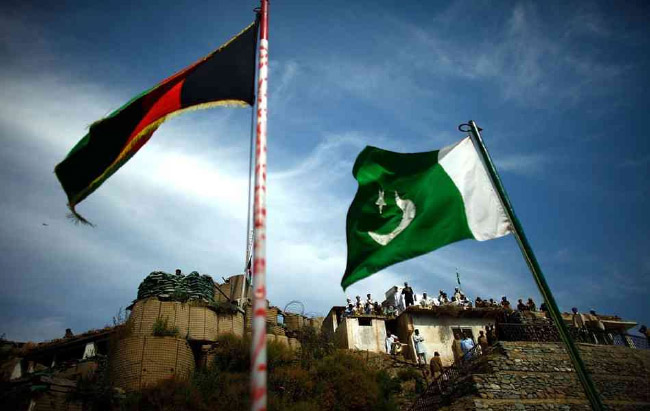Involving in blame game and exchanging harsh rhetoric following the escalation in militancy, Kabul and Islamabad could neither push the Taliban to negotiation table nor alleviate insurgency. The Taliban, along with Haqqani-network, continue their terrorist activities and carry out large-scale attacks, mainly in Afghanistan. It is more likely that if Afghan-Pak officials worked in tandem for combating insurgency, the result would be more fruitful. Emotional talks in political issues have widen the gap between the two states.
The blame game was not restricted in political debates but also affected the life of simple individuals and triggered public sentiments. For instance, when I was walking with a Pakistani journalist in Xinjian airport of China about a month ago, I was hurt to see that he was given cold shoulder by my own compatriot. This reveals the fact that the political tension between Afghan-Pak officials has put its ill impact on the life of simple individuals. On the other hand, the role of India in Afghanistan is introduced highly negative for Pakistani citizens. That is to say, India’s role in this country is judged with negative presumptions and tinged with personal color rather than fact. These issues will lead to horrible consequence and all countries need to pursue factual affairs.
Recently, China has offered to take on a role as mediator between Pakistan and Afghanistan. According to a statement released by Afghanistan’s Presidential Palace, Chinese foreign minister Wang Yi will visit Kabul soon and would work to discuss the possibility of setting up a meeting between the four members of the Quadrilateral Coordination Group (QCG) consisting of Afghanistan, Pakistan, the United States and China.
The four-nation group was formed in January 2016 for reconciliation in Afghanistan through the direct peace talks between the Taliban and the Afghan government.
The mutual relations degenerated as Pakistan had closed the Pak-Afghan border in mid-February this year, following a string of militant attacks that Islamabad blamed on militants hiding in Afghanistan. The closure of the formal crossing points on the 2,600km porous border was ordered after the Sehwan shrine bombing that claimed around 100 innocent lives.
Earlier this month, Ashraf Ghani lashed out at Pakistan at the Kabul Process, alleging that it is waging an “undeclared war of aggression” against Afghanistan. Last week, Prime Minister Nawaz Sharif and Ashraf Ghani held a meeting on the sidelines of the Shanghai Cooperation Organization summit where both the leaders agreed to use the QCG mechanism as well as bilateral channels to undertake specific actions against terrorism.
Recently, Pakistan State and Frontier Regions Minister Abdul Qadir Baloch also said that his country would extend its full cooperation for peace and stability in Afghanistan. The relations between the two countries ebbed and flowed for years. The two countries sought to bring the Taliban to negotiating table and address the insecurity in one way or another. The formation of QCG for persuading the Taliban to hold talks with Afghan government is one of the examples of mutual efforts. However, their relations ebbed away for one or another reason.
Although the relations between Kabul and Islamabad seems to thaw, there is still not much optimism since this relation remain fragile and unpredictable. For instance, the QCG was ended with the death of Omar’s successor Mullah Akhtar Mansour, who was killed by the US drone in Baluchistan. It is likely that a mysterious hand seeks to worsen the mutual relation.
It should be noted that Afghanistan and Pakistan suffer painfully under terrorist activities and both are in the same boat. Militant fighters seek relentlessly to shed the blood of combatants and non-combatants in Afghan-Pak soils. In such a critical time, the two neighboring countries will have to pursue mutual interests and friendly relations rather than the blame game.
It is an undeniable fact that exchanging harsh rhetoric and pointing finger at each other will deteriorate the security situation and widen the rift between the two countries. It will never defuse the tension or alleviate militancy. The militant fighters will certainly capitalize on the issue and intensify their attacks to fuel the tension.
Before bringing the Taliban to peace table, Kabul and Islamabad need to resolve their own issue and build mutual trust. Subsequently, they will be able to design roadmap either for arranging peace talks or for launching a strong operation against the bases of terrorist networks. In brief, Afghan-Pak officials will have to sit in a friendly environment and have their heart-to-heart say about their challenges. They must define terrorism and enemy and adopt a mutual strategy for combating it.
It is hoped that the Afghan-Pak officials will improve their relation in the best possible way so as to adopt shared mechanism for counterinsurgency and bring the militant fighters to their knees.
Home » Opinion » Afghan-Pak Mutual Relations
Afghan-Pak Mutual Relations
| Hujjatullah Zia

